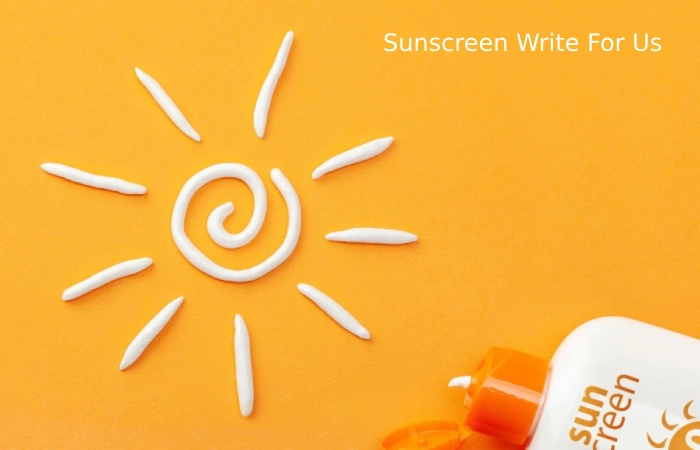
Sunscreen Write For Us
Sunscreen Write For Us – Sunscreen help stop ultraviolet (UV) rays from reaching the skin. There are two types of ultraviolet radiation, UVA and UVB, which damage the skin and increase the risk of skin cancer. UVB light is the foremost cause of sunburn. While UVA rays penetrate the skin more intensely, they relate to wrinkles, loss of elasticity, and other effects of photoaging. It also worsens the carcinogenic effects of UVB rays, and UVA light is increasingly considered a cause of skin cancer. Sunscreen differs in its ability to protect against UVA and UVB rays.
Sunscreen can’t protect you from all kinds of solar damage. it comes in various forms (cream, lotion, gel, stick, spray, and lip balm, for example).
How to submit an article
If you’d like to submit an article, please email contact@vigorblog.com
What is Sunscreen?
 Sunscreens protect the skin from the sun’s harmful rays and help delay the beginning of wrinkles and early aging (such as sunburn and leathery skin). Sunscreens also aid in reducing the risk of skin cancer and sunburn-like skin reactions (sun sensitivity) brought on by some medications, such as phenothiazines like chlorpromazine and tetracyclines. Sunscreen comes in various forms, including cream, lotion, gel, sticks, sprays, and lip balms.
Sunscreens protect the skin from the sun’s harmful rays and help delay the beginning of wrinkles and early aging (such as sunburn and leathery skin). Sunscreens also aid in reducing the risk of skin cancer and sunburn-like skin reactions (sun sensitivity) brought on by some medications, such as phenothiazines like chlorpromazine and tetracyclines. Sunscreen comes in various forms, including cream, lotion, gel, sticks, sprays, and lip balms.
What does the (SPF) mean?
The (SPF) sun protection factor on a sunscreen label measures how well the sunscreen protects against ultraviolet B (UVB) raysSunburns are mostly caused by UVB radiation. However, just like UVA rays, they can also cause skin cancer. The SPF on the label doesn’t say anything about a sunscreen’s ability to block UVA rays.
Higher SPF numbers mean more excellent protection from UVB rays. But no sunblock can block all UVB rays. For instance, a sunscreen with an SPF of 30 blocks about 97% of UVB rays, and a sunscreen with an SPF of 50 blocks back 98% of UVB rays.
How Does Sunscreen Work?
Sunscreen formulations generally combine several ingredients that help prevent the sun’s UV rays from reaching the skin. There are two types of sunscreen activities available:
- Mineral sunscreens protect your skin from the sun by reflecting and absorbing the sun’s rays. They contain minerally sourced particles such as zinc oxide and titanium dioxide and form a shield over the skin that helps prevent UV light from penetrating the skin. Mineral sunscreens are ideal for sensitive skin.
- Chemical sunscreens work by chemically absorbing the sun’s rays, preventing them from penetrating the skin. They contain synthetic compounds like Avobenzone or Homosalate that help prevent damage by transforming UV rays into non-damaging forms of energy, like non-UV light or heat. They are also known as organic sunscreens and are often combined to provide complete protection.
A broad-spectrum sunscreen protects you from UVA and UVB rays; SPF stands for Sun Protection Factor, and SPF measures how much sunscreen has against sunburn. Applying sunscreen with an SPF of 15, for example, means that it will take 15 times longer for your skin to burn than it would without sunscreen.
Why It’s Vital to Choose the Right Sunscreen for Your Skin Type
Sunscreen protects the skin from ultraviolet (UV) rays and visible light (human eyes can see). Exposure to light without adequate protection accelerates skin aging and increases the risk of skin cancer. Regular daily use of SPF 15 sunscreen reduces the risk of developing squamous cell carcinoma by 40% and melanoma by 50%, according to the Skin Cancer Foundation.
Find out the right sunscreen for your skin type helps avoid skin irritation. It also increases the likelihood of using sunscreen regularly, giving your skin the best chance of avoiding premature aging and cancer.
Guidelines For Guest Posting
- Write error-free, plagiarism-free, and well-formatted articles.
- Content should be unique, spelling checked and make sense.
- Pick the trending subject or topic that matches the stuff we publish.
- Avoid spam or broken links in the content.
- Do not use words or statements that are unnecessary. Use attractive words instead.
- We will not publish articles with incorrect data.
- Add copyright-free images of high-resolution at least 1 (Mandatory).
- Minimum 800 words in length.
- Articles must be related to our categories or target audience. We don’t publish irrelevant categories.
- Do appropriately interlink our articles.
Search Terms Related to Sunscreen Write for Us
Lotion
Topical
Ultraviolet
Sunburn
Carcinomas
Squamous Cell
Melanoma
Phytophotodermatitis
Squamous Cell Carcinoma
Skin Cancer
Basal Cell Carcinoma
Sun Sensitivity
White
Titanium Dioxide
Nanoparticles
Search Terms for Sunscreen Write for Us
Sunscreen Write for Us
Write for Us Sunscreen
Sunscreen Guest Post
Guest Post Sunscreen
Sunscreen Contribute
Contribute Sunscreen
Sunscreen Submit Post
Submit Post Sunscreen
Sunscreen submit an article
Submit an article Sunscreen
Sunscreen become a guest blogger
A guest blogger Sunscreen
Sunscreen writers wanted
Wanted writers Sunscreen
Sunscreen suggest a post
Suggest a post Sunscreen
Sunscreen guest author
Guest author Sunscreen
You can send your article to contact@vigorblog.com
